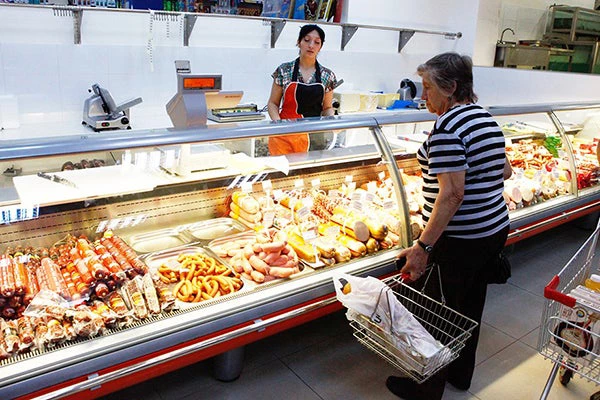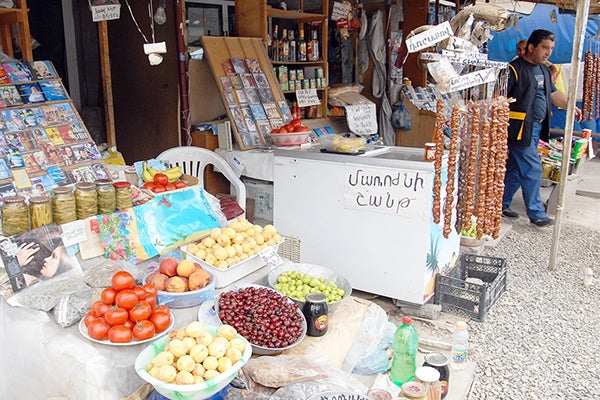I was quite surprised recently to find out that a poll of 1,066 people across Yerevan and all ten regions of Armenia revealed substantial gaps in public awareness of food safety and people's behavior. The
Social Survey on Food Safety Public Awareness (June 2015) may have produced some provoking outcomes, but it could certainly become a roadmap for the
State Service for Food Safety (SSFS) in its efforts to further enhance food safety in Armenia.

The survey, which covered a wide scope of issues, classifies the food safety awareness level of respondents as "average" - because they demonstrated poor knowledge of some key issues. For instance, only 10% of respondents are aware of the SSFS, the state agency responsible for protecting their rights when it comes to buying food.
It should be noted, nevertheless, that the SSFS does not always receive up-to-date information on the shortcomings and violations related to issues under its jurisdiction. While the agency does run a hotline - which other state institutions like the Ministry of Labor and Social Issues have found to be effective in enabling people to bring issues and concerns directly to institutions - consumers' awareness of the hotline number is as low as 1%.
The survey findings also suggest that food-buyers recognize the potential health risks related to foods - an indication that the public-at-large is prepared to act carefully. But people also need to learn what they should look out for and how. Most respondents focused primarily on the “best-before” expiration date of food products. The reason is quite simple: public knowledge of nutritional and caloric values is poor.
Meanwhile, the confidence level in food safety is simply too low! 50% of the respondents are not willing to call the hotline, as they do not believe that the state agency can ever impose any sanctions on the well-known supermarkets. Mistrust is a well-known and widespread "disease" for most food-buyers, many of whom distrust food labeling - including the expiration date.
Consumer behavior is also adaptive and strongly influenced by far too low levels of awareness and confidence. Around 60% of respondents prefer buying food from street vendors, since they consider it convenient, inexpensive, close to home, and fresher. In particular, street milk emerges as one of the most problematic food safety challenges due to manufacturing and transportation conditions. This is pretty surprising: over 60% of food-buyers among the surveyed households in Armenia are women who are traditionally and culturally careful.
Less than half of the respondents are willing to voice a problem or complain when confronted with any food safety violation. Most will simply put the item back on the shelf and remain silent.
One more revelation is that residents of Yerevan showed higher awareness of food safety than those from the marzes/provinces. Consumers in urban areas across the country generally have better knowledge than rural respondents.
Obviously, food-buyers with this profile will hardly become high-profile allies of food safety authorities. Therefore, the food safety public awareness campaign should become the cornerstone of the SSFS communications strategy, with strong and focused awareness policies to equip consumers with better knowledge and a sense of their "right to complain".
Otherwise, the agency will have to face up to food safety issues all by itself, and public health risks will persist. These enduring challenges don't even cover the food safety scandals that have overwhelmed Armenian consumers in recent years and led to increased mistrust among consumers.
Just over one-quarter (27%) of the survey respondents claimed to know about a public agency tasked with this topic, and just 1% mentioned SSFS by name as the country’s food safety oversight agency. Only 2% of the respondents are aware of SSFS territorial divisions. “Name recognition” of SSFS is essential, since the public-at-large needs to learn more about the competent agency that they can consult and trust for food-safety issues. Public confidence in the authority can’t be higher without visible and effective activities.

Television is the main (if not the only) channel to provide the public with information about the agency. Almost half of the respondents learned about food-caused diseases from TV reports. By publicizing its hotline through social ads, the agency can raise public awareness and provide the people with a tool to quickly and efficiently respond to any food safety violation. And then … we can talk about the efficiency of social media in targeting youth in both urban and rural areas!
I am not sure that food safety is among the top concerns of the Armenian people, since I have never seen it listed by any survey … but it’s literally everywhere, throughout people’s lives. And the current survey exposes the truth that most respondents are upset about the food safety situation in the country.
The most optimistic news - shared by the majority of respondents - is that they prefer locally made products! Building a trustworthy relationship through the triangle of "SSPS-consumers-local producers" with an adequate and active communications strategy could reduce potential food safety dangers through real-life Armenian examples: “Eat well. Eat safe!”
-------------------------------------------------------------
The Social Survey on Food Safety Public Awareness was conducted by the AM Partners, Consulting Company within the Food Safety Capacity Building Project financed by the Institutional Development Fund (IDF) grant of the World Bank.

The survey, which covered a wide scope of issues, classifies the food safety awareness level of respondents as "average" - because they demonstrated poor knowledge of some key issues. For instance, only 10% of respondents are aware of the SSFS, the state agency responsible for protecting their rights when it comes to buying food.
It should be noted, nevertheless, that the SSFS does not always receive up-to-date information on the shortcomings and violations related to issues under its jurisdiction. While the agency does run a hotline - which other state institutions like the Ministry of Labor and Social Issues have found to be effective in enabling people to bring issues and concerns directly to institutions - consumers' awareness of the hotline number is as low as 1%.
The survey findings also suggest that food-buyers recognize the potential health risks related to foods - an indication that the public-at-large is prepared to act carefully. But people also need to learn what they should look out for and how. Most respondents focused primarily on the “best-before” expiration date of food products. The reason is quite simple: public knowledge of nutritional and caloric values is poor.
Meanwhile, the confidence level in food safety is simply too low! 50% of the respondents are not willing to call the hotline, as they do not believe that the state agency can ever impose any sanctions on the well-known supermarkets. Mistrust is a well-known and widespread "disease" for most food-buyers, many of whom distrust food labeling - including the expiration date.
Consumer behavior is also adaptive and strongly influenced by far too low levels of awareness and confidence. Around 60% of respondents prefer buying food from street vendors, since they consider it convenient, inexpensive, close to home, and fresher. In particular, street milk emerges as one of the most problematic food safety challenges due to manufacturing and transportation conditions. This is pretty surprising: over 60% of food-buyers among the surveyed households in Armenia are women who are traditionally and culturally careful.
Less than half of the respondents are willing to voice a problem or complain when confronted with any food safety violation. Most will simply put the item back on the shelf and remain silent.
One more revelation is that residents of Yerevan showed higher awareness of food safety than those from the marzes/provinces. Consumers in urban areas across the country generally have better knowledge than rural respondents.
Obviously, food-buyers with this profile will hardly become high-profile allies of food safety authorities. Therefore, the food safety public awareness campaign should become the cornerstone of the SSFS communications strategy, with strong and focused awareness policies to equip consumers with better knowledge and a sense of their "right to complain".
Otherwise, the agency will have to face up to food safety issues all by itself, and public health risks will persist. These enduring challenges don't even cover the food safety scandals that have overwhelmed Armenian consumers in recent years and led to increased mistrust among consumers.
Just over one-quarter (27%) of the survey respondents claimed to know about a public agency tasked with this topic, and just 1% mentioned SSFS by name as the country’s food safety oversight agency. Only 2% of the respondents are aware of SSFS territorial divisions. “Name recognition” of SSFS is essential, since the public-at-large needs to learn more about the competent agency that they can consult and trust for food-safety issues. Public confidence in the authority can’t be higher without visible and effective activities.

Television is the main (if not the only) channel to provide the public with information about the agency. Almost half of the respondents learned about food-caused diseases from TV reports. By publicizing its hotline through social ads, the agency can raise public awareness and provide the people with a tool to quickly and efficiently respond to any food safety violation. And then … we can talk about the efficiency of social media in targeting youth in both urban and rural areas!
I am not sure that food safety is among the top concerns of the Armenian people, since I have never seen it listed by any survey … but it’s literally everywhere, throughout people’s lives. And the current survey exposes the truth that most respondents are upset about the food safety situation in the country.
The most optimistic news - shared by the majority of respondents - is that they prefer locally made products! Building a trustworthy relationship through the triangle of "SSPS-consumers-local producers" with an adequate and active communications strategy could reduce potential food safety dangers through real-life Armenian examples: “Eat well. Eat safe!”
-------------------------------------------------------------
The Social Survey on Food Safety Public Awareness was conducted by the AM Partners, Consulting Company within the Food Safety Capacity Building Project financed by the Institutional Development Fund (IDF) grant of the World Bank.


Join the Conversation